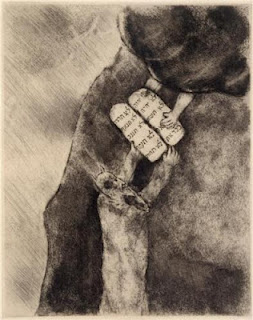 |
| Ash Wednesday Karl Spitzberg (1808-85) |
Ash Wednesday, which begins the season of Lent, is a very
ancient observance . Originally it was a period of preparation for catechumens
-- people who wish to be baptized into the Christian church. Participation in
the life of the Church was strictly limited for those who had not been
baptized, and the weeks of Lent were set aside for a rigorous program of study,
prayer and fasting that would conclude with Baptism at the Great Vigil of
Easter. The category of catechumens has long been abandoned, and while a more
open inclusive spirit is to be welcomed, no doubt, it is arguable that the
Church has swung too much the other way, requiring very little indeed of those
who would attend its services. Accordingly it is worth focusing with greater
concentration on the discipline of Lent.
The readings for Ash Wednesday point us firmly in the right
direction, while at the same time indicating the spiritual obstacles that lie
in the way. Through the prophet Joel, God pleads, "Return to me with all
your heart,with fasting, with weeping, and with mourning", adding
immediately the warning that we should not confuse outward show with inward
spirit --"rend your hearts and not your clothing". Isaiah issues the
same warning even more firmly "Such fasting as you do today" he tells
the Israelites, "will not make your voice heard on high". Why
not? Because it is self-serving and
unaccompanied by the real repentance that reveals willingness to change the way
they run their lives.
 |
| The Prophet Joel, Sistine Chapel -- Michaelangelo |
In the Gospel passage, Jesus expresses this same concern. He
denounces the showy penitence of the righteous who seek to impress those who
witness their zeal. In the light of this passage, which is always used on Ash Wednesday, the ancient, and now very
widespread practice of the Imposition of Ashes seems a little odd. Does it not
conflict with Jesus' explicit
instruction to "wash your face, so that your fasting may be seen
not by others"? Imposition, though, is not meant as a sign of fasting.
Rather, it is a tangible as well as visible acknowledgment of the truth that
lies at the heart of all religion -- our mortality. "Remember, O Man, that
thou art dust, and unto to dust thou shalt return" is the traditional
version of the solemn sentence that is uttered as ashes are imposed in the
shape of a cross.
We cannot put off dying, but we can put it out of mind. Yet
it is a simple fact that there will come a day when we no longer exist. At that
point, the story of our lives -- whether good, bad or trivial - is finalized
for ever. The trouble is that we do not know exactly when that day will be.
This is why the readings for Ash Wednesday include the memorable urgency of
Paul's second letter to the Corinthians "See, now is the acceptable time;
see, now is the day of salvation!". And so it is for us too. The sole hope
of immortality is eternal life in God through Christ.












